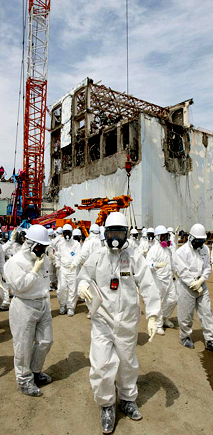Fukushima fallout hurts Japan's nuclear view
 A new survey shows the shifting view of nuclear power in Japan since the 2011 Fukushima disaster.
A new survey shows the shifting view of nuclear power in Japan since the 2011 Fukushima disaster.
Two-thirds of Japanese companies want and expect a lesser role for nuclear power than the government is seeking, the Reuters survey showed.
All 43 of the country's reactors are offline due to a tougher safety regime introduced after meltdowns, explosions and plumes of radioactivity were released by the 2011 earthquake and tsunami.
Prime Minister Shinzo Abe's wants nuclear energy restored back to providing 20-22 per cent of the nation's electricity by 2030.
Abe says it will reduce Japan's heavy reliance on imported fossil fuels, and could help drive the economy out of two decades of sub-par growth.
But over two-thirds of firms in the Reuters Corporate Survey, conducted in mid-May, wanted levels of less than 20 per cent due to the strong public opposition.
“Some nuclear power stations may resume operations, but it will be difficult to expect as many restarts as the government and utilities want,” a corporate manager at a machinery company wrote in the survey.
Detialed analysis showed a wide variation in the expectations of big Japanese firms.
Fourteen per cent saw nuclear power accounting for less than 10 per cent of Japan's energy mix by 2030, while around 25 per cent forecast levels of 10-14 per cent, and 29 per cent saw levels of 15-19 per cent.
Analysis by the same media group last year found that about a third - two-thirds at most - of Japan's reactors will ever pass the more stringent safety checks imposed since the disaster.
Even then they must clear other seismological, economic, logistical and political hurdles if they want to restart.
If a third of Japan’s reactors were brought back online, they would provide nuclear energy to account for 10 per cent of the total supply.
Government regulators have signed off on the basic safety of five reactors since last year, in tentative steps toward their re-awakening.
Despite an average 20 per cent rise in household electricity bills from imported fuel, most public opinion polls says opposition to nuclear restarts is about twenty times higher that support.
Residents and activists have been doing all they can to block the restart of even the five reactors that meet new safety standards.
With the nuclear future so contentious and unclear, Japan has also moved to drive electricity prices down by opening the market to more international competition.
But the new survey says this may not work, with two-thirds of companies not expecting deregulation to have a big impact on energy costs.








 Print
Print